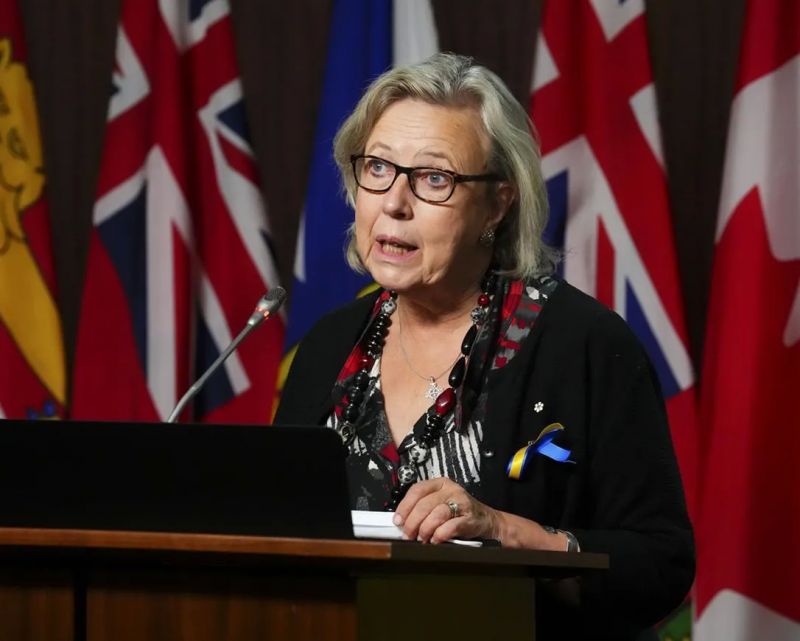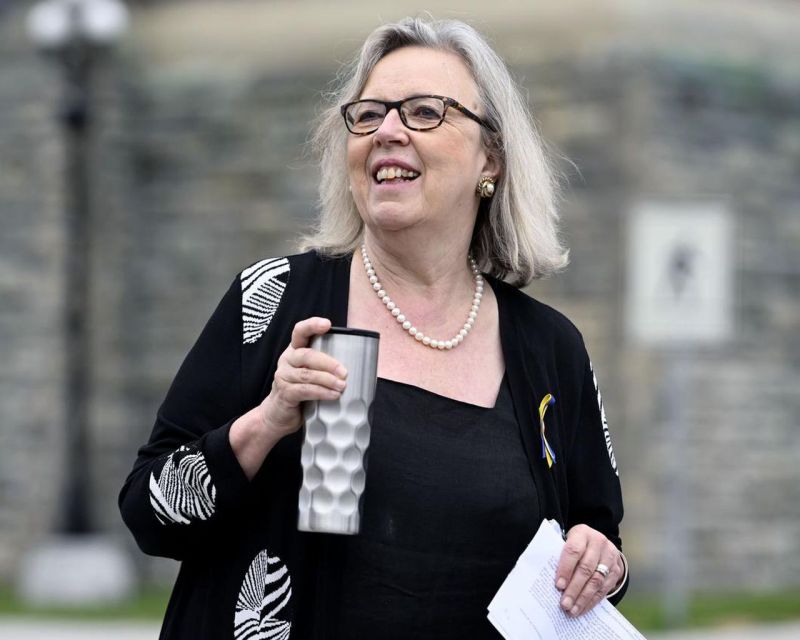Before the Green Party's new leader is selected in Ottawa on Saturday, November 19, 2022, co-leadership contenders Jonathan Pedneault and Elizabeth May pose for a picture.

Before the Green Party's new leader is selected in Ottawa on Saturday, November 19, 2022, co-leadership contenders Jonathan Pedneault and Elizabeth May pose for a picture.
After a disappointing outcome in the recent federal election, internal public disputes, and a decline in fundraising, the national Green Party named a well-known figure as its leader on Saturday night. However, she will be working with others.

On the sixth and final ranked ballot, Elizabeth May, a veteran lawmaker from British Columbia who worked as party leader from 2006 to 2019, won with 4,666 votes. She held the lead, but Anna Keenan maintained a solid second-place position.
Elizabeth May will take over as federal Green Party leader and share the running mate position
May ran for office on a ticket with Jonathan Pedneault, a 32-year-old crisis management specialist from Montreal who has looked into abuses in war zones like Afghanistan.
As required by the current regulations, they ran separate campaigns, but Pedneault will serve as deputy leader. According to May, the two will work to change the party's charter to make official co-leadership possible.

May stated in her acceptance speech on Saturday night, "It means a different leadership model that emphasizes that Greens do things differently. I insisted that all the candidates, not just Pedneault, join me on stage.
"We don't have a boss or top-down leader who directs people's speech, where they should go, or how to vote, the woman said.
May, 68, emphasized her experience throughout the leadership campaign and claimed that she left everything in excellent shape when she resigned following the 2019 federal election.
Green candidates received 6.5% of the popular vote in that election, but not enough to become an official party in the House of Commons. As a result, three members of that parliament were elected.
Support fell to 2.3% of the popular vote in the election of 2021 when the turbulent reign of former leader Annamie Paul had already reached new lows. Mike Morrice was elected in Ontario, and May retained her seat. Paul finished fourth in the Toronto Center bid.
May said in her victory speech, "Three years ago, I stepped down as leader confident that the party was strong and ready with three elected MPs to see a change."
"I do believe that change is necessary. I hear the voices calling for change, younger leadership, and a new strategy as the party moves forward.
May entered the contest intending to revive the party. Many anticipate that she will make an effort to increase its support, including by reaching out to NDP supporters who are dissatisfied with Jagmeet Singh's leadership.
May said in comments before the results were public, "It has been a bit of a rough patch, but we're out of it now. "And we can confidently state that we are one no matter what happens tonight.
We are collaborating. May and Pedneault will try to show that the Greens are more reliable than other parties regarding the environment.
Although most politicians of all stripes now acknowledge that voters care about climate change, May and Pedneault contend that other parties' policies don't go far enough to reduce emissions and combat the environmental crisis.
She declared on Saturday, "We're the only relevant party. Voting for the Green Party began on November 12 at around 8 p.m., and results soon began to trickle into party members gathered at a hotel in downtown Ottawa.
Only slightly more than 8,000 of the approximately 22,000 members who could vote did so on the first ballot. When questioned on Saturday by a reporter, May stated that she was "disappointed" with the turnout.
It's a good display of support from our membership and their dedication to this party, May said. "But I have to say, given the climate in which this campaign was fought, I think all of us a candidate felt the headwinds," she continued.
Throughout the six-month campaign, candidates for the party's leadership quickly acknowledged the organization's difficulties. They had presented various strategies for mending fences, energizing supporters, and gaining new voters.
Paul announced her resignation as the leader of the Green Party shortly after the 2018 election, making history by becoming the first Black woman to head a Canadian federal party.
An earlier attempt to remove Paul as leader was accompanied by many accusations that she characterized as "racist" and “sexist.” According to Paul, she was the leader during "the worst period" of her life.
May referred to a "mismatch" between Paul's "skills and talents" and what a Green Party leader ought to be during a debate on November 9.
She stated during the debate that the party needs someone to listen to others.
After Paul resigned as Green Party leader, an astrophysicist named Amita Kuttner took over and became Canada's first transgender party leader.
Kuttner, who also identifies as nonbinary, didn't run for permanent office but stressed the importance of maintaining party cohesion while they were in office.
During the leadership race, several candidates—including Keenan and her running mate Chad Walcott—mentioned the need for less division. In a "make-or-break moment," the other co-leadership pair had argued that the party needed their fresh perspectives more than anything.
The remaining candidates on the ballot were Sarah Gabrielle Baron and Simon Gnocchini-Messier. They had previously run unsuccessfully for the party.

